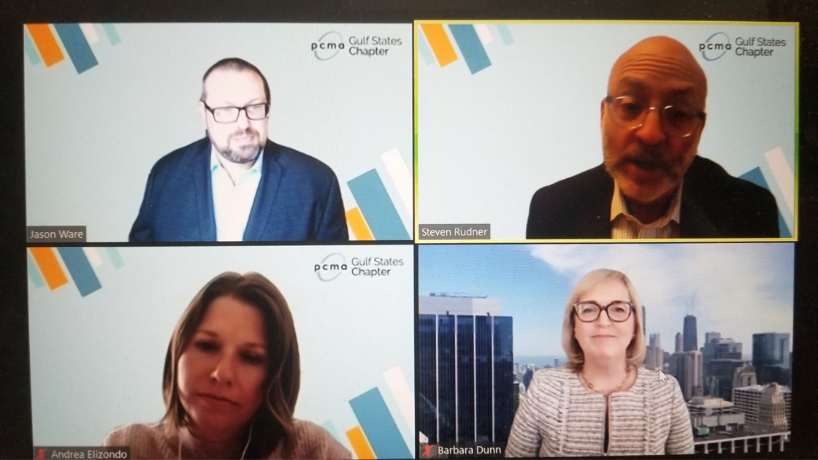Contracts with facilities and other vendors are usually the most intimidating part of a meeting planner’s job as it relates to selecting a location and event partners. These same contracts can be difficult for the facilities and vendors as well in working to making a meeting happen.
“I really try and pride myself on building relationships with my vendors,” said Andrea Elizondo, the Association of Texas Professional Educators Events Director, who was speaking as part of panel on the PCMA Gulf States Chapter program, Contracting in a Post-COVID World last week. “I really think that it is so important and I work very hard to have an understanding, not only obviously of my association and what our pain points are, but also the hotel side or any other vendor that we’re working with.”
In 2020, these relationships were put to the test as planners and vendors tried to make sure each were not losing money while maintaining relationships and making the best of really bad situation. The byproducts of last year’s struggle were planners’ and vendors’ acute awareness of the importance of language in a contract and the changes and alterations to contracts they would do moving forward.
Force Majeure was utilized for many for the first time ever. Some group’s contracts weren’t as inclusive as they needed to be while others were fine. However, panelist Stephen Rudner, owner of Rudner Law Offices and an elite meetings industry attorney warns to be careful before altering your cancellation parameters in your contracts to include too many scenarios.
“At the risk of sounding like the fifth-grade grammar teacher that everyone hated, I’ll tell you that the law really looks carefully at the language and strictly interprets the language of the clause that you use,” said Rudner who represents facilities in contract counseling and disputes. “I know that the natural instinct of every planner when we have a crisis like Covid is to re-examine their existing Force Majeure clause that’s used by the hotels that they are dealing with and run to amend that Force Majeure clause and I would suggest this exactly the wrong time to do that.”
Rudner said that the Force Majeure clauses worked as they should for this pandemic and were appropriate for this crisis. The concern he warns about is if a planner changes the terms to try and include scenarios that aren’t real disasters and his terms “water down” the Force Majeure, the planner could find themselves without a space for their meeting.
“If you got a hotel to accept (the updated clause) and as the economy rebounds and people are back in business of having meetings and hotels are full, you don’t want to force them, as your clause is written so broadly, that you allow the hotel to cancel your meeting based on the Force Majeure clause that you wrote. So, I would be cautious about that.”
As meetings are moving to live and hybrid events, trying to address protocols with facilities and the changing climate toward Covid and vaccinations, planners are having to juggle the needs and concerns of their leadership and attendees when working with their vendor partner. There are many questions to ask.
Barbara Dunn, with Chicago-based Barnes and Thornburg, LLP, is a lawyer who represents companies and groups in contract-dispute cases with facilities, says planners should inquire as much as possible about the hotel’s or convention center’s approach to hosting meetings in today’s climate.
“In terms of the obligations of the vendor or the facility versus the group, certainly I think the group has the right to do its due diligence and ask what the hotel or the venue is doing relative to its employees and their safety.” Dunn said. “I think it’s often forgot attendees may be vaccinated, hotel staff or other venue staff often may not be depending where you are. That is certainly an issue. So, asking the question is reasonable.”
“Obviously, first it’s a bouncing ball,” Dunn continued. “Second, understand the hotel sensitivities with regard to employee information on health and safety.”
Dunn says the conversations about regulations and standards should be had between both parties, but they might not need to be written on paper. “I think there’s a shared responsibility,” she said. “I don’t think it belongs in the contract. It belongs in a conversation and also recognition that that’s going to change probably by the minute.”

